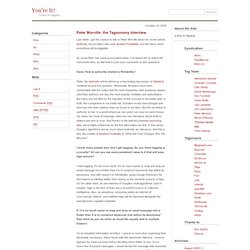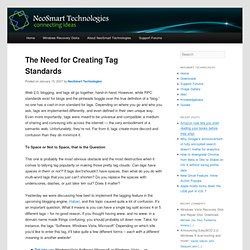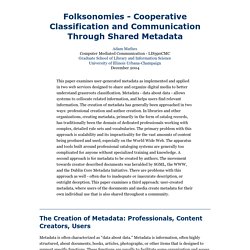

Facet. Spartagus. The externalisation of meaning. "Google TechTalk" by David Weinberger about "Everything in miscellaneous". You’re It! » Blog Archive » Peter Morville: the Tagsonomy interview. Last week I got the chance to talk to Peter Morville about his recent article Authority, his excellent new book Ambient Findability, and the future when everything will be taggable.

As usual Peter has some provocative ideas. I’ve asked him to watch the comments here, so feel free to post your comments or ask questions. Gene: How is authority related to findability? Peter: My authority article stirred up a fascinating discussion on Web4Lib centered around this question. Historically, librarians have been comfortable with the notion that the most frequently cited academic papers (and their authors) are also the most popular, findable, and authoritative. I know many people who don’t get tagging. I hate tagging. If “it’s so much easier to drag and drop an email message into a folder than it is to construct keywords that define its aboutness” then what do you do when an email fits equally well in multiple folders?
I’m an impatient information architect. You say the future is multi-algorithmic. Bottom Up Tagging » SlideShare. The Need for Creating Tag Standards at The NeoSmart Files. Web 2.0, blogging, and tags all go together, hand-in-hand.

However, while RPC standards exist for blogs and the pinheads boggle over the true definition of a “blog,” no one has a cast-in-iron standard for tags. Depending on where you go and who you ask, tags are implemented differently, and even defined in their own unique way. Even more importantly, tags were meant to be universal and compatible: a medium of sharing and conveying info across the internet — the very embodiment of a semantic web. Unfortunately, they’re not. Far from it, tags create more discord and confusion than they do minimize it. To Space or Not to Space, that is the Question This one is probably the most obvious obstacle and the most destructive when it comes to tallying tag popularity or making those pretty tag clouds: Can tags have spaces in them or not?! Yesterday we were discussing how best to implement the tagging feature in the upcoming blogging engine, Habari, and this topic caused quite a lot of confusion. Public could help BBC to index archive.
Pilot project allows listeners to add searchable keywords to audio programmes The BBC could ask listeners to write programme information about its radio news bulletins in order to make its vast archives more accessible to future generations of licence payers.

Under the Annotatable Audio project, radio listeners would be able to mark and add descriptive keywords to segments of programming they want to flag for bookmarking or sharing with others. It means they could highlight a specific item within a lengthy bulletin stream and return to that particular point later. Inspired by Flickr and Wikipedia, the project is a private, early-stage pilot of social software produced at BBC Radio and Music Interactive that lets listeners slice programmes into chunks that can be identified by using tags. "How are people supposed to find the specific bit of audio or video that they're looking for? Comments From BeachBum, 11:27 10 November 2005 Peter, the whinging Pommie bastard. H2O Playlist: Home. You’re It! Approaching a definition of Web 2.0 - The Social Software Weblog - socialsoftware.weblogsinc.com _
Home. Folksonomies - Cooperative Classification and Communication Through Shared Metadata. The Creation of Metadata: Professionals, Content Creators, Users Metadata is often characterized as “data about data.”

Metadata is information, often highly structured, about documents, books, articles, photographs, or other items that is designed to support specific functions. These functions are usually to facilitate some organization and access of information. Administrative, structural, and descriptive metadata are three broad categories of metadata (Taylor, 2004). This paper focus primarily on descriptive metadata which identifies and functions to organize information based on its intellectual content. Traditionally metadata is created by dedicated professionals. While professionally created metadata are often considered of high quality, it is costly in terms of time and effort to produce. User created metadata is a third approach, and this paper focuses on grassroots community classification of digital assets. Tagging Content in Del.icio.us and Flickr “a social bookmarks manager.